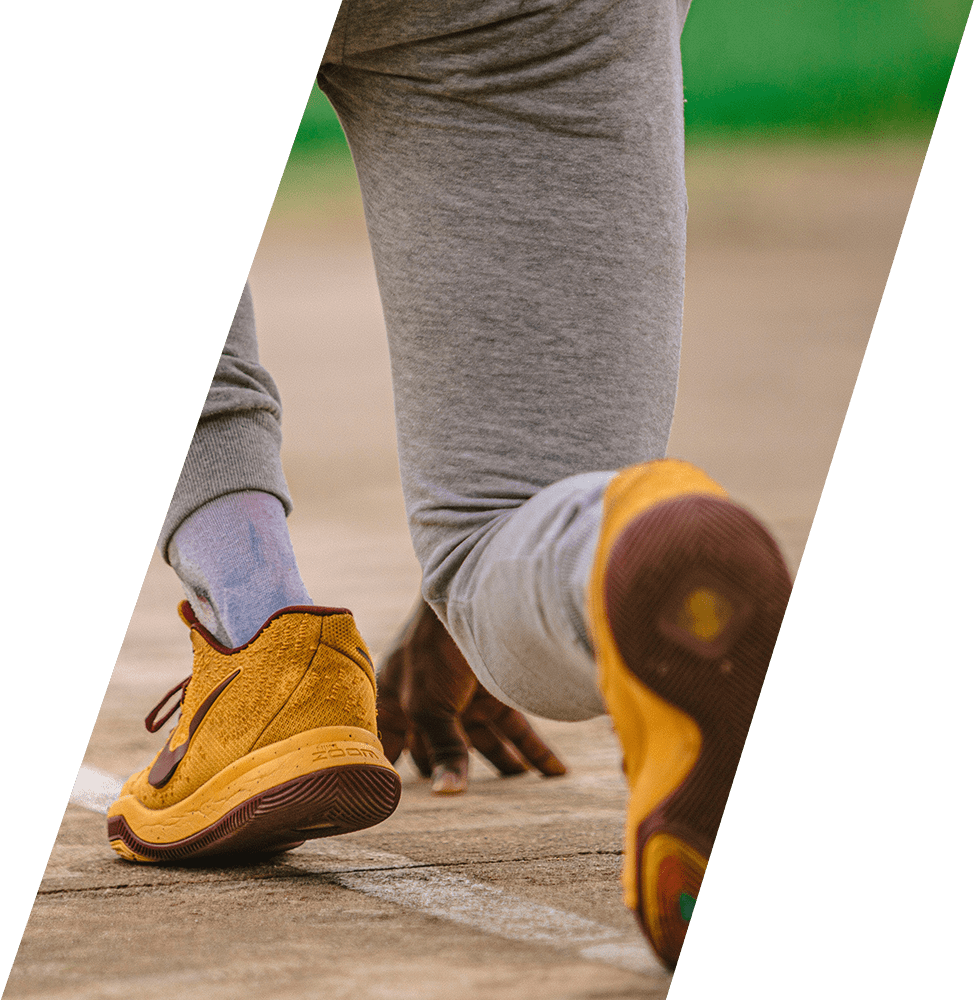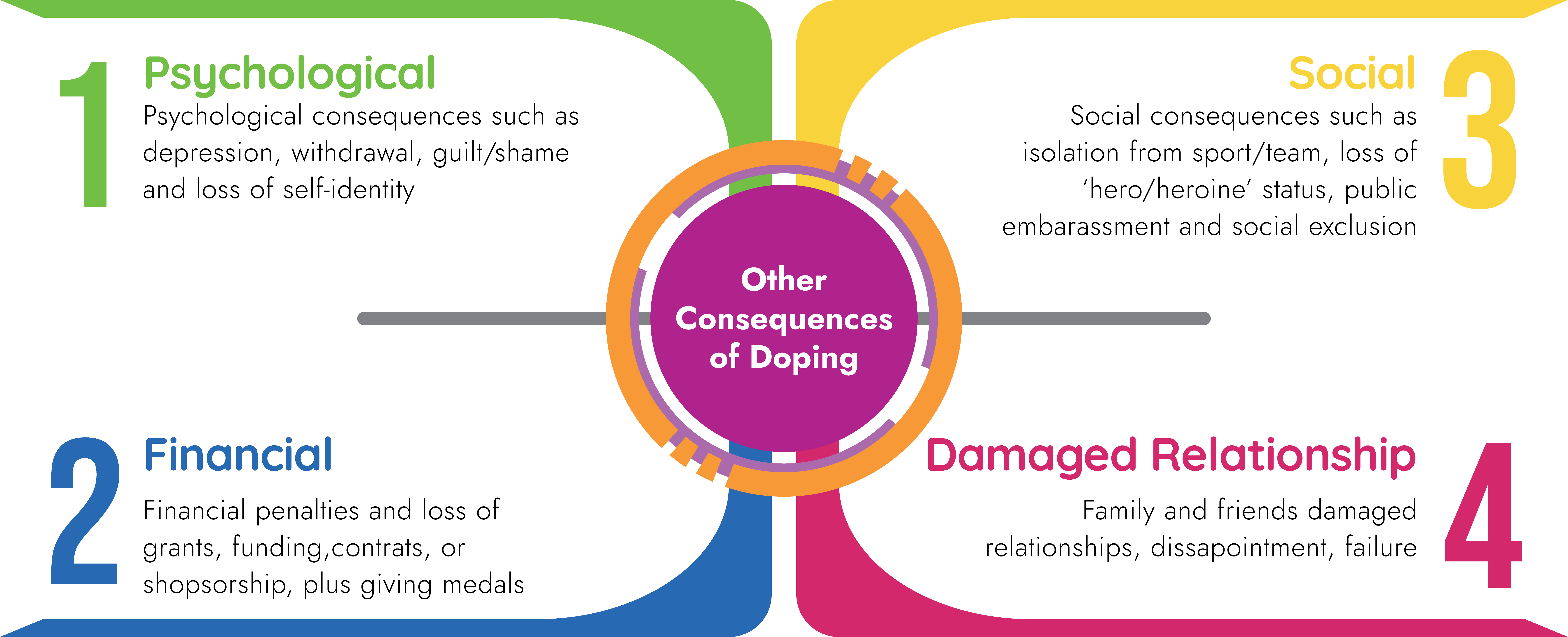Consequences of Doping
Many athletes want to find a competitive edge to help them go faster, train longer, recover quicker or be stronger.
That edge can be attained by eating well, good hydration, reliable recovery methods (i.e. rest and good quality sleep), measured training techniques and a whole lot of really, really hard work.
But some athletes decide to cross that ethical line by trying something more.


Whether it’s a suggestion from a coach or friend, or it’s a decision made solely for themselves – some athletes decide to cheat by taking banned substances, or using banned methods, putting them at risk of a four-year ban from all sport.
Athletes that cross the line are risking more than just their reputation and their careers – they’re also putting their health at serious risk.
Some athletes believe that since many substances on the WADA Prohibited Listare legitimate medications that they must be safe to use. However, this couldn’t be further from the truth.
Medications are for people with specific health issues – not for healthy athletes. These medications are not approved to be used by healthy people, in higher doses nor in combination with other substances. Taking them when your body doesn’t need them can cause serious damage to your body and destroy your athletic career.
Some banned substances which athletes have also used are not medications. In fact, some banned substances that are marketed as the next big thing (often via word of mouth or on the internet) are not even approved for human use.

Prohibited Substance and Side Effects
Anabolic drugs are drugs that help to assimilate in the human body. It is a drug that has been tempted by many athletes in the past because it is very helpful for muscle growth. But it’s a drug with a lot of side effects.
Example of Substances:
Testosterone, stanozolol, and clenbuterol
Side Effect(s):
- General: This drug has side effects such as increased risk of liver disease (e.g., hepatitis, liver cancer), increased risk of heart disease, high blood pressure, severe acne, and increased risk of sudden death in severe cases. Please check the gender side effects.
- Male: Testicular atrophy, decreased sperm count, spermatosis, erectile dysfunction, sexual dysfunction, enlarged prostate gland, breast hypertrophy, hair loss, etc.
- Female: Hirsutism (whole body including face), menstrual cycle disturbance, hair loss, clitoris hypertrophy, stretch marks, voice masculinity, etc.
A classification that includes hormones and related drugs that can improve performance by engaging in various control functions of the human body. Growth hormones and erythropoietin (EPO) are among the representative S2.
Side Effect(s):
May die of hypertension, stroke, and vascular obstruction due to thrombosis
A drug that acts specifically on the beta receptors of the sympathetic nerve and has an effect on bronchial dilatation.
Example of Substances:
Representative drugs include salbutamol, formoterol
Side Effect(s):
Palpitations, headache, arrhythmia, muscle cramps, nausea, nervousness, tremors
Artificially, hormones and metabolic modifiers can be used to change the levels of certain hormones in the body.
Example of Substances:
Typically, Insulin and the like correspond to S4.
Side Effect(s):
Insulin, a representative substance, is widely used to treat diabetes, but it has side effects such as hypoglycemia, which can lead to death.
This drug controls the amount of moisture in the body and can be abused for weight control and weight loss.
Example of Substances:
Some of the most popular drugs are furosemide, spironolactone, etc.
Side Effect(s):
Severe low blood pressure (which can lead to death), severe dehydration (which can lead to death), fainting, muscle cramps and muscle aches, confusion.
A drug that increases the body’s activity and reduces fatigue so that a player can exercise continuously.
Side Effect(s):
It increases the risk of heart attack, stroke and arrhythmia and can cause side effects of insomnia, anxiety, rapid weight loss, dependency and addiction symptoms, dehydration, tremors, heart rate and blood pressure rise.
A drug used as a treatment for neural and cancerous pain. In Indonesia, it is a drug that is tightly controlled under the law on drug management.
Example of Substances:
Typical S7 drugs include Morphine and Fentanyl.
Side Effect(s):
May cause strong poisoning symptoms, anxiety, hallucinations, and confusion.
As a hemp extract, cannabinoids are a drug that should not be used by not only athletes but also non-athletes in accordance with the laws on drug administration in Indonesia.
Side Effect(s):
Respiratory disorder, cognitive impairment, dependency, psychotic disorder.
Corticosteroids are anti-inflammatory drugs, and representative drugs.
Example of Substances:
Prednisolone (prednisolone) and triamcinolone.
Side Effect(s):
Hypertension, osteoporosis, decreased immunity, thrombosis, endocrine disorders, increased blood sugar, muscle loss, cataracts, glaucoma, pancreatitis, fractures.
Drugs that block the sympathetic beta receptors to reduce heart rate and improve concentration. Only prohibited in certain sports (shooting, archery, etc.)
Side Effect(s):
Fatal bronchial seizures (which can lead to death), hypotension, heart disease (arrhythmia, heart failure), poor concentration, sleep disorders, sexual dysfunction, chronic fatigue.

The Well-being Approach
Health professionals including sports physicians and sports dietitians advise that athletes can get the best performance results by maintaining a healthy diet for their training and competition needs, getting enough sleep, keeping hydrated and putting in lots of really hard work.
It is recommended that athletes have a varied and nutritious diet filled with good amounts of protein, carbohydrates and fats. Bananas are a good source of energy helping to improve the digestive system and kidneys. Chicken and other protein sources are good for building and maintaining muscle mass and foods that are rich in vitamins such as broccoli help the body recover faster from injuries and muscle fatigue.
Sleep is vital for the health and performance of all athletes. Professionals recommend athletes get up to seven to nine hours of sleep per night. Inadequate sleep can result in fatigue, a lack of concentration, and can slow the recovery process.
Adequate hydration is one of the most important parts of an athlete’s diet. Maintaining good hydration levels can help sustain body volume, and regulate body temperature. It also helps reduce the risk of heat stress, maintain muscle function and prevent a decrease in performance and fatigue.
But what about dietary or nutritional supplements? All natural! Pure! Fast results! Not quite.
Beware!
Supplements have often been found to contain ingredients not on the label – meaning you never know what you are taking. There could be a banned substance in your ‘all natural’ supplement. Beware of the risks.